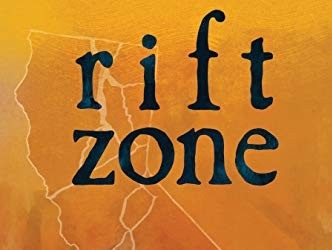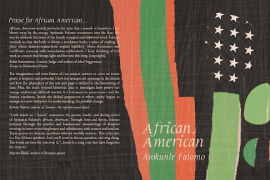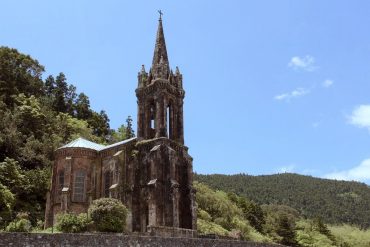Our Interviews Editor Esteban Rodríguez talks with poet Tess Taylor about the importance of place, the sober realities of reacquainting oneself with home, and the inspirations and influences behind her newest collection Rift Zone (Red Hen Press 2020).
Esteban Rodríguez: Can you speak about how Rift Zone came to be?
Tess Taylor: Rift Zone came into being in a couple of ways. The earliest poems are simply of homecoming, as I moved from the east coast back to the town I’d left fifteen years before. When I left as a 17-year-old, I never thought I’d be back; I hated my town. Later it seemed like a good place to perch and have children, which I also did while I was writing this book. Coming back, I was struck by many things— familiar slants of light, scents, and micro-seasons I hadn’t seen since I was a child. California’s raw beauty is akimbo to the east-coast version many books tell of the seasons; it is literally at the far edge of another continental plate, at a tear in the earth and at the edge of a deep sea trench. Our dramatic foggy summers remind us we’re perched along air currents that sail from Alaska to Mexico. The miraculous redwoods with their 2,000-year-old lives and their endlessly living roots are some of the largest living organisms on earth. We also (as is so soberingly relevant now) live in a place with cycles of fire.
I marveled at things I had loved and missed. Meanwhile, the Bay Area I grew up in, amid the children of hippies and civil rights leaders and grandchildren of shipyard workers and survivors of internment camps — had also changed. There were new extremes: The internet economy was booming, but we had also failed to solve basic problems of hunger and housing and climate change. I came home to a Bay Area of skyrocketing home prices and tent cities, of long fire seasons, of drought. And my childhood kept haunting me. There had been so much racism, police in the schools; shootings. Who had we been then? Why had it felt that way? There’s a poem that says
“how have I survived / even this life?” I felt some enormous haunted privilege in surviving.
ER: In addition to surviving one’s own life, there is a sense of surviving the history associated with one’s home. In the poem “Song with Schist & County Line “the speaker recalls the history of El Cerrito and how it has changed from just a little hill to a land with a BART station and a Trader Joe’s. How important is it to decode history in addition to your childhood?
TT: How do we know a place, really, if we don’t know its history, its geology, its plant names, the seasons its wind blows? I just mentioned the fog, which makes for a cold July, reflecting the cold ocean currents coming down from Alaska. Fog is one pull of the world on this place I now sit. It is the same with a history—my town was Ohlone, then Spanish land grant, then Mexican hacienda, then contested, then a site of Japanese internment, then a racist sundown town. And it was also the seemingly-sleepy working class town where I grew up. I was interested in the American violence in those transitions. The seismic layers. Faulkner once said “The past is never dead. It’s not even past.” He said that in the South, where part of my family is from. California makes mythologies of its own newness, of its amnesia to itself. But histories accompany us, like geology or weather. We move inside them, whether we know to name them or not.
ER: Your collection Last West, which follows Dorothea Lange and her journey across California during the Depression, was released last February, two months before Rift Zone. Can you talk a little about that collection, and how you see this book connecting with Rift Zone and your work as a whole?
TT: It was a wild convergence having two books come out in one spring! They are linked, though I wasn’t conscious at first of them developing in parallel. As I mentioned, Rift Zone had been in the works for 10 years, since I moved back from Brooklyn. So, there I am, circling my neighborhood, teaching writing at UC Berkeley. During those days, I stumbled across a fact: Dorothea Lange had photographed my neighborhood, the humble cottages of El Cerrito. This fascinated me and made me wonder what she had been seeing. For wasn’t she the one who photographed the Okies, the Great Depression? How had her life worked? Hadn’t she been a working artist-mother, too? What could she teach me about my own California? I went to the UC Berkeley library and got out all the books. Having her nearby as an artist companioned me a little. If I had lived in Paris, or NYC, there might be a hundred artists who could offer a model, but here was Lange, turning a rare lens to my hometown. She helped me read the landscape of my childhood, its backstory as an endpoint on the Great Migration. She captured the enormous paradox and promise of a moment that desegregated workplaces, the new hope of a group of people finding their way after the Great Depression, and also a moment when our country incarcerated Japanese Americans.
Well, the issues she photographed then seem eerily resonant now: shelterlessness, migration, climate change, the carceral state, the struggle simply to get by. She offered a lens, and her lens felt vivid. In my pain and restlessness after the 2016 election, I found that Dorothea Lange’s notebooks live in the Oakland Museum, and I went to see them. They were full of haunting fragments and lists of towns she’d passed through, quotations from people she met along the road. She had an ear for language. The chorus of American struggle she captured felt utterly contemporary. When I saw the notes, my heart throbbed. So: I drove all over California. I followed her trails. I made new notes. And this book was born. It was quite a journey.
ER: How do you go about composing a poem? (Set a specific time to write; write in a notebook, computer, etc.; look to other mediums as inspiration).
TT: I think poems begin in an overhearing, welcoming the ghosts that come tapping on the ear. These ghosts are not orderly; they sneak up on a body; for me they more likely when I allow myself some waywardness. Like my fascination with Lange—I can have an inexplicable passion nearly a decade in the making before a “project qua project” announces itself as such.
As for ideas: I try to greet them casually, saunter over to get to a notebook, allow them in. Sometimes words come fast. Sometimes I just listen to the humming taking shape. Sometimes it is like being present for the coming of a wild animal or the confidence of a child. It is important to be present but also not to look straight on or jump too much. Maybe I stay with my back turned, doing the dishes. Sometimes I pause. Get still. Observe a phenomenon. Take some notes. Later, I go through my journals of sketches and see which seem to be open to being transcribed, or build on their initial music. Which ideas keep following me. “Something about Lange” was like this, or “Book about coming home.”
Finally, some day when I am brave enough, I poke around in my piles and notes; I find something to tinker with. Often as soon as I announce one path, I find that my secret mind is off to its own burrow to dig another path. It goes on like this. The artistic imagination is not dutiful. But maybe finally some poems sing a bit with one another. I listen then, too. I try to follow. I resist proclaiming to know too soon what they are about. This is why it takes me 10 years to write most books.
ER: If you could describe your poetic journey in a few words, what would they be?
TT: I teach sometimes, but year in and year out I am a working writer. The how of this, week in week out, link by link, has a quality of bafflement. I have been lucky that each year some new gift of time or money has come. There are also moments of confusion, of loss, of wondering how to go on. Sometimes I’ll reach a landmark—a book, a piece in the NY Times, whatever—and I’ll feel reminded that no matter what amazing thing happens you still face the blank page. Before enlightenment, chop wood, carry water; after enlightenment, chop wood, carry water.
What advice would you give to your younger self?
TT: Have good friends you trust, take good care of your health, foster relationships with people who believe in you. Be in community. Becoming more stable as I have grown some has made me more productive—some of the uncertainties of my twenties were wildly crippling. And: I once heard an interview on Terry Gross with Ben Kweller, who is usually a rock musician but found every so often that he had written a country western song. He did this. He wrote the song he heard and kept the songs in a folder until suddenly, many years later, he found he had an album. I love that: write the songs you hear. Don’t judge what you make, just make it, let it come through you. The curator steps in later; the curator finally can see the album. But when the instinct comes, just love the music. Write the songs you hear.





